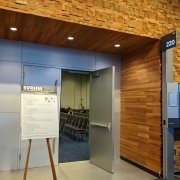Princeton’s Joshua Peterson and Harvard’s Arturo Deza flew earlier that week to Vancouver, British Columbia for the Neural Information Processing Systems (NeurIPS) conference, the world’s premiere machine learning venue, where they organized the Shared Visual Representations in Human and Machine Intelligence (SVRHM) workshop along with MIT-CBMM’s Ratan Murty and Princeton’s Tom Griffiths. The SVRHM workshop was sponsored in part by the Center for Brains, Minds and Machines (CBMM.)
“SVRHM was the highlight of NeurIPS for me this year!'' recalled Olivier Hénaff a Research Scientist at DeepMind. Both Olivier Hénaff and Irina Higgins -- a Senior Research Scientist at DeepMind -- opened the first session as speakers of the workshop and gathered one of the biggest crowds at only 9 am. Will Xiao, a graduate student from Harvard Medical School, and Bill Freeman a professor from MIT’s CSAIL, followed up with complementary talks on brain representations and the future of computer vision respectively. “We decided to invite Bill to give his famous CVPR talk: `Feathers, Wings and Future of Computer Vision’, early in the workshop as we knew it would set the tone for the rest of the day, and we’re happy it did!” said Arturo Deza, soon to continue his postdoc at MIT’s CBMM.
The second session included Erin Grant (UC Berkeley) and Ruairidh Battelday (Princeton) who both discussed connections between learning in humans and machines. They were later followed by MIT-CBMM’s Andrei Barbu who delivered a talk covering his recent Object-Net paper. Professor Mike Tarr closed the second session with a personal anecdote mentioning how when he was a teenager, he and his friends envisioned a vision meeting like SVRHM where psychologists and engineers would sit together and have conversations about the future of visual intelligence, and he was happy to see that day arrive and be a part of it.
As the lunch break began, Machine Learning and Cognitive Science rockstars made an entrance including Yann LeCun, Bernhard Schölkopf, Max Welling, Josh Tenenbaum and Garrison Cottrell, who smoothly toured around the poster session and were one of the lucky recipients of a free workshop t-shirt. The poster session had a total of 19 posters each summarizing an accepted workshop paper from institutions from all over the world. “My favorite poster was Tom White’s”, said Ratan Murty, who bought a collection of Tom White’s deep neural network inspired art that was displayed at the poster session. Tom White is an Artist and Lecturer from the Victoria University of Wellington’s School of Design who happens to do research in deep learning on the side, and presented work at SVRHM on Shared Visual Abstractions in humans and machines. =
The workshop also provided a platform for young assistant professors to connect with each other. Some of these included Chaz Firestone, Alexander Ecker, Yalda Mohsenzadeh and Talia Konkle who opened the third session with a talk that compared face and scene representations learned in deep neural networks and in brains via representational similarity analysis. The session also included talks from Nikolaus Kriegeskorte’s new research on controversial stimuli, Matthias Bethge’s approach of understanding perception via perturbation-based models, and Eero Simoncelli’s engineering-flavored views on Local Gain Control as a canonical computation in the human visual system. It concluded with a panel discussion that was moderated by the eloquent Colin Conwell, a NeurIPS first-timer and a once comparative literature major who is now a graduate student at Harvard’s Vision Sciences Lab working on human and machine psychophysics.
The workshop ended with a closing ceremony where jokes were made, and prizes were given. These included an NVIDIA Titan V for the Best Paper Award that was awarded to Judy Borowski and Christina Funke from Universität Tübingen, and an Oculus Quest for the Best Poster Award awarded to Katherine Hermann from Stanford University. Finally, MIT’s Quest for Intelligence sponsored a generous and larger than life closing reception that accompanied the attendees with a view of the Pacific Ocean. There were smiles everywhere.
"It was such an unbelievable day!", concluded Joshua Peterson.

